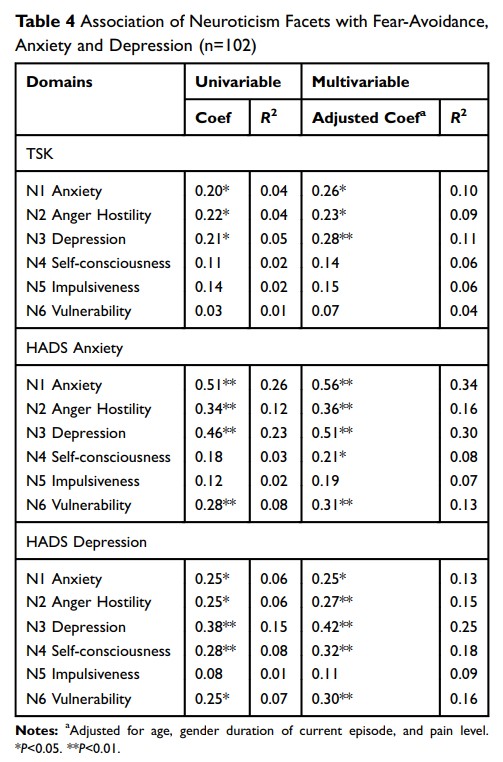9 0 9 6 8
论文已发表
注册即可获取德孚的最新动态
IF 收录期刊
- 2.6 Breast Cancer (Dove Med Press)
- 3.9 Clin Epidemiol
- 3.3 Cancer Manag Res
- 3.9 Infect Drug Resist
- 3.6 Clin Interv Aging
- 4.8 Drug Des Dev Ther
- 2.8 Int J Chronic Obstr
- 8.0 Int J Nanomed
- 2.3 Int J Women's Health
- 3.2 Neuropsych Dis Treat
- 4.0 OncoTargets Ther
- 2.2 Patient Prefer Adher
- 2.8 Ther Clin Risk Manag
- 2.7 J Pain Res
- 3.3 Diabet Metab Synd Ob
- 4.3 Psychol Res Behav Ma
- 3.4 Nat Sci Sleep
- 1.9 Pharmgenomics Pers Med
- 3.5 Risk Manag Healthc Policy
- 4.5 J Inflamm Res
- 2.3 Int J Gen Med
- 4.1 J Hepatocell Carcinoma
- 3.2 J Asthma Allergy
- 2.3 Clin Cosmet Investig Dermatol
- 3.3 J Multidiscip Healthc

Big Five Personality Traits and Disabling Chronic Low Back Pain: Association with Fear-Avoidance, Anxious and Depressive Moods
Authors Ibrahim ME, Weber K, Courvoisier DS, Genevay S
Received 6 November 2019
Accepted for publication 24 March 2020
Published 14 April 2020 Volume 2020:13 Pages 745—754
DOI https://doi.org/10.2147/JPR.S237522
Checked for plagiarism Yes
Review by Single-blind
Peer reviewer comments 2
Editor who approved publication: Dr Michael A Überall
Purpose: Physical dysfunction in chronic low back pain patients is influenced by psychological variables rather than by pain severity. Assessing personality traits may help clinicians address the complexity of patients’ experiences and design treatments that target these vulnerabilities. This study aimed to identify the distinguishing personality traits of a cohort of patients with disabling chronic low back pain and to determine associations between those traits and fear-avoidance beliefs, depressive, and anxious moods.
Patients and Methods: This cross-sectional study included 102 chronic low back pain patients (57% male), who failed standard management and were referred to a multidisciplinary rehabilitation program. All patients completed the five domains of the NEO Personality Inventory (NEO PI)–Revised (Neuroticism, Extraversion, Openness to experience, Agreeableness and Conscientiousness), the Tampa Scale for Kinesiophobia (TSK), and the Hospital Anxiety and Depression Scale (HADS). One-sample t-test was used to compare sample personality means with average population norms. Association between the five personality domains with TSK and HADS was assessed using Pearson’s correlation, adjusted for patient demographics and pain-related variables. Linear regression was used to estimate associations adjusted for covariates.
Results: Both men and women had significantly lower scores in the Openness to experience domain and significantly higher scores in the Conscientiousness domain than the general population norms. After adjusting for covariates, Neuroticism was associated with higher fear-avoidance, depression and anxiety scores. Conversely, Extraversion and Openness to experience negatively correlated with depression scores. Extraversion also inversely correlated with fear-avoidance. Conscientiousness negatively correlated with depression and anxiety after adjustment.
Conclusion: Patients with disabling chronic low back pain show personality characteristics that deviate significantly from the normal population norms but do not reach maladaptive forms of personality disorders. Clinicians would benefit from assessing patients’ personality traits to address protective and risk factors for psychological distress, particularly in difficult-to-treat, highly disabled low back pain patients.
Keywords: NEO PI, anxiety, depression, kinesiophobia, chronic low back pain, personality
